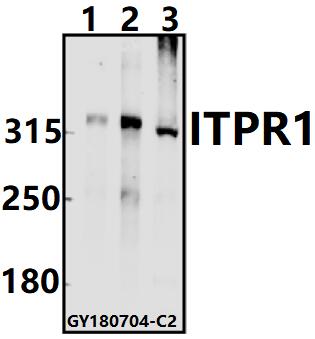Product Name :
ITPR1 polyclonal antibody Background :
Inositol 1,4,5-triphosphate (IP3) functions as a second messenger for a myriad of extracellular stimuli including hormones, growth factors and neurotransmitters. Receptor tyrosine kinases indirectly increase the intracellular levels of IP3 through the activation of phospholipases such as phospholipase C (PLC), which convert phosphatidylinositol-4,5 bisphosphate into IP3 and diacylglycerol (DAG). The inositol 1,4,5-triphosphate receptor, IP3R, acts as an inositol triphosphate (IP3)-gated calcium release channel in a variety of cell types. Three IP3 receptor subtypes have been described and are designated IP3R-I, IP3R-II and IP3R-III. IP3R-I is the predominant IP3R subtype expressed in neuronal tissues and the central nervous system, but is also expressed at high levels in the liver. Product :
Rabbit IgG, 1mg/ml in PBS with 0.02% sodium azide, 50% glycerol, pH7.2 Storage&Stability :
Store at 4°C short term. Aliquot and store at -20°C long term. Avoid freeze-thaw cycles. Specificity :
ITPR1 pAb detects endogenous levels of ITPR1 protein. Immunogen :
Synthetic peptide, corresponding Human ITPR1. Conjugate :
Unconjugated Modification :
Unmodification
ITPR1 polyclonal antibody Background :
Inositol 1,4,5-triphosphate (IP3) functions as a second messenger for a myriad of extracellular stimuli including hormones, growth factors and neurotransmitters. Receptor tyrosine kinases indirectly increase the intracellular levels of IP3 through the activation of phospholipases such as phospholipase C (PLC), which convert phosphatidylinositol-4,5 bisphosphate into IP3 and diacylglycerol (DAG). The inositol 1,4,5-triphosphate receptor, IP3R, acts as an inositol triphosphate (IP3)-gated calcium release channel in a variety of cell types. Three IP3 receptor subtypes have been described and are designated IP3R-I, IP3R-II and IP3R-III. IP3R-I is the predominant IP3R subtype expressed in neuronal tissues and the central nervous system, but is also expressed at high levels in the liver. Product :
Rabbit IgG, 1mg/ml in PBS with 0.02% sodium azide, 50% glycerol, pH7.2 Storage&Stability :
Store at 4°C short term. Aliquot and store at -20°C long term. Avoid freeze-thaw cycles. Specificity :
ITPR1 pAb detects endogenous levels of ITPR1 protein. Immunogen :
Synthetic peptide, corresponding Human ITPR1. Conjugate :
Unconjugated Modification :
Unmodification
-
 Western blot (WB) analysis of ITPR1 pAb at 1:500 dilution Lane1:The Brain tissue lysate of Mouse(40ug) Lane2:The Brain tissue lysate of Rat(40ug) Lane3:U-87MG whole cell lysate(40ug)
Western blot (WB) analysis of ITPR1 pAb at 1:500 dilution Lane1:The Brain tissue lysate of Mouse(40ug) Lane2:The Brain tissue lysate of Rat(40ug) Lane3:U-87MG whole cell lysate(40ug)
Bioworld Biotech only provide peptides for our antibodies and do not provide additional peptide customization services.
Price/Size :
USD 368/1mg/vial
Tips:
For phospho antibody, we provide phospho peptide(0.5mg) and non-phospho peptide(0.5mg).Describe :
Blocking peptides are peptides that bind specifically to the target antibody and block antibody binding. These peptide usually contains the epitope recognized by the antibody. Antibodies bound to the blocking peptide no longer bind to the epitope on the target protein. This mechanism is useful when non-specific binding is an issue, for example, in Western blotting (WB) and Immunohistochemistry (IHC). By comparing the staining from the blocked antibody versus the antibody alone, one can see which staining is specific; Specific binding will be absent from the western blot or IHC performed with the neutralized antibody.Formula:
Synthetic peptide was lyophilized with 100% acetonitrile and is supplied as a powder. Reconstitute with 0.1 ml DI water for a final concentration of 10 mg/ml.The purity is >90%,tested by HPLC and MS.
Storage:
The freeze-dried powder is more stable. For short time at 2-8°C. For long term storage store at -20°C.
Note :
This product is for research use only (RUO only). Not for use in diagnostic or therapeutic procedures.
 ITPR1 polyclonal antibody
ITPR1 polyclonal antibody  Datasheet
Datasheet COA
COA MSDS
MSDS SHIP
SHIP